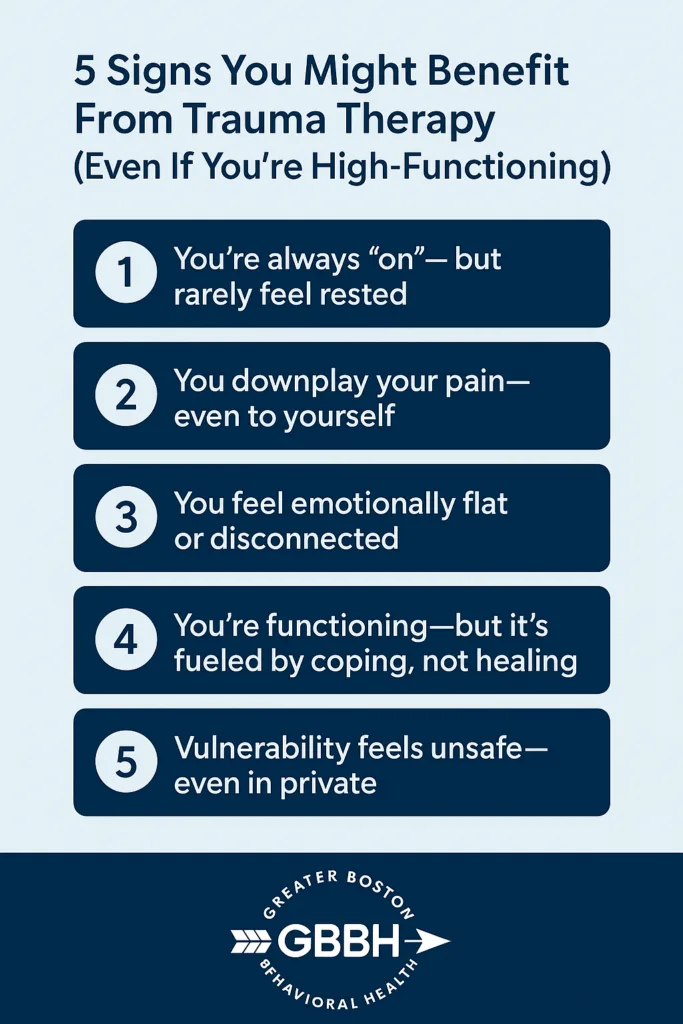You keep the calendar full. You hit your deadlines. You’re the one people turn to. From the outside, it all works.
But inside, something feels off. Quietly, persistently off.
At Greater Boston Behavioral Health, we see you. Being high-functioning doesn’t mean you’re not hurting. Trauma doesn’t always show up as panic attacks or flashbacks—it can hide in overachievement, in hyper-independence, in the pressure to always hold it together. Here are five signs it might be time to consider a trauma therapy program.
1. You’re always “on”—but rarely feel rested
You can power through anything. But that power often comes at a cost: insomnia, tension headaches, constant muscle tightness. Even when your body stops, your mind doesn’t. You might fall asleep only to wake up hours later, already bracing for the next day.
This chronic state of alertness is a telltale sign of trauma. It keeps your nervous system activated, preventing the deep rest your body and mind need.
What looks like energy can actually be survival mode.
In trauma therapy, you learn to recognize these stress patterns, not judge them. You build new ways to downshift—so rest becomes something you feel, not just schedule.
2. You downplay your pain—even to yourself
“That was a long time ago.”
“It wasn’t that bad.”
“Other people have been through worse.”
If those sound familiar, you’re not alone. Many high-functioning adults have learned to minimize emotional pain in order to stay productive. You compartmentalize. You rationalize. And for a while, it works.
But just because you’ve adapted doesn’t mean you’re healed. In fact, minimizing trauma is one way it holds power over you. It shows up in subtle ways: tightness in your chest, irritability, difficulty connecting with others.
Our trauma therapy program in Boston, MA provides a safe, respectful space to unpack what you’ve tucked away—without judgment or re-traumatization.
3. You feel emotionally flat or disconnected
You’re not in crisis. You’re not depressed. But you’re also not really feeling much of anything.
Maybe you’ve noticed it during celebrations—a birthday, a big promotion, a family event. Everyone else is smiling, but you’re just going through the motions.
This emotional numbing is a lesser-known trauma symptom. It’s your brain’s way of protecting you from overwhelm. But over time, it blocks not just pain, but joy, connection, and spontaneity.
Trauma therapy can help you feel safe enough to feel again. Not all at once. Not dramatically. But slowly, gently—in a way that honors your pace.
4. You’re functioning—but it’s fueled by coping, not healing
You always have a plan. You keep people at ease. You stay productive. But underneath all that functioning, there’s a quiet sense of exhaustion.
If your day is driven by anxiety, if your to-do list feels like a lifeline, if stillness feels unsafe—you may be managing unprocessed trauma.
Coping is a skill. But healing is different. Healing invites you to ask: What if I didn’t have to hold it all together? What would life feel like with less pressure, less armor?
In our trauma therapy program, we work with high-functioning adults to create safety that isn’t tied to control. You don’t have to choose between your strength and your softness.
5. Vulnerability feels unsafe—even in private
You have people in your life who care. But when it comes to opening up, there’s a wall. You might listen deeply to others, yet share little about yourself.
Sometimes even being honest in your own journal feels hard. Like naming the truth might unravel something you’ve worked hard to keep intact.
That instinct to protect yourself is valid. Trauma teaches us that openness equals danger. But therapy can offer a different kind of experience: one where your vulnerability is met with steadiness, not chaos.
At Greater Boston Behavioral Health, our trauma-informed clinicians don’t push. We meet you where you are. We move at your pace. And we hold space for whatever you bring into the room.
Why High-Functioning Doesn’t Mean Unaffected
Many people believe trauma has to be dramatic or destructive to matter. But trauma isn’t about the event—it’s about how your system adapted to survive. And sometimes, those adaptations look a lot like success.
That’s why so many high-performing adults delay getting help. It’s hard to admit something might be wrong when everything appears fine. But trauma doesn’t wait until it’s convenient. It shows up in the cracks—in tension, disconnection, and burnout.
A trauma therapy program can help you reconnect with parts of yourself you’ve had to hide. And you don’t have to lose your strength to do it.
FAQs About Trauma Therapy at Greater Boston Behavioral Health
What is trauma therapy, exactly?
Trauma therapy is a specialized form of talk therapy that helps individuals process and heal from distressing experiences. Our clinicians use evidence-based approaches like EMDR, cognitive processing therapy (CPT), and trauma-informed CBT to support healing at your pace.
Is trauma therapy only for people with PTSD?
No. While trauma therapy is helpful for those with PTSD, it’s also effective for anyone experiencing symptoms related to past distress—including anxiety, emotional numbness, perfectionism, or chronic stress.
Can I do trauma therapy if I’m still functioning well in daily life?
Absolutely. Many of our clients are high-functioning professionals, caregivers, and leaders who are struggling in less visible ways. Functioning doesn’t mean you’re not suffering.
How do I know if I need trauma therapy or another type of support?
That’s something we can help you explore in an initial consultation. You don’t need to have a diagnosis to start. Just a sense that something isn’t sitting right.
Is this available in-person or online?
Greater Boston Behavioral Health offers both in-person trauma therapy in Boston, MA and secure telehealth sessions for Massachusetts residents.
Ready to Feel Safe—Inside and Out?
You don’t need to wait for a breakdown to ask for help. If you recognize yourself in these signs, a trauma therapy program could offer relief you didn’t know was possible.
At Greater Boston Behavioral Health, we help high-functioning adults heal quietly, steadily, and safely.
Ready to talk it through? Call us at (888) 301-8072. You deserve support that honors both your strength and your softness.
Internal Link Suggestions:


